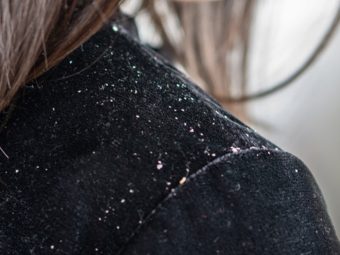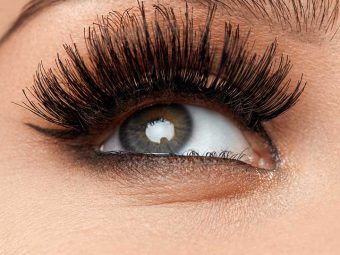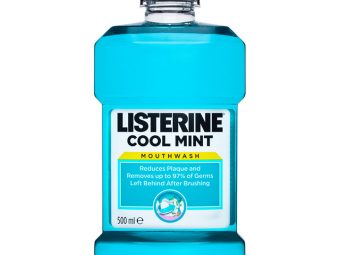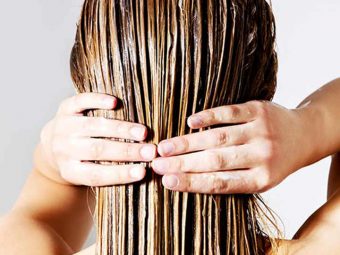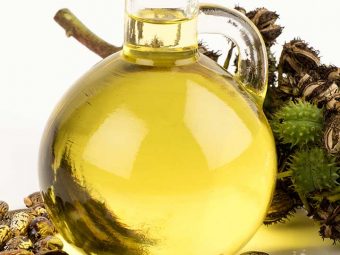Neem Oil For Dandruff: 7 Ways It Works
Easy tips to help you reap the maximum benefits of this oil and clear dandruff flakes.
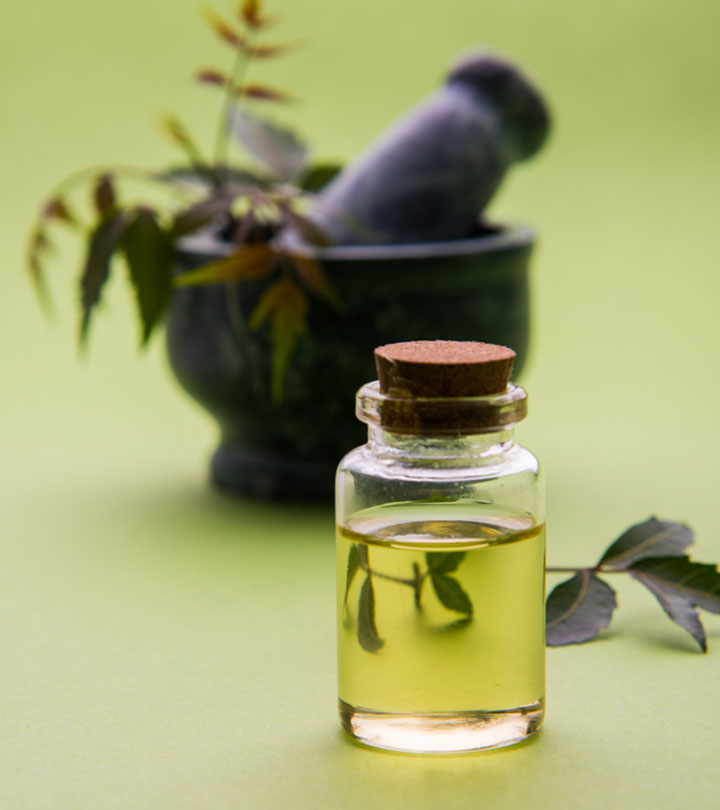
Most branded anti-dandruff shampoos are filled with chemicals that may leave your scalp dry and your hair rough, fragile, and dull. A safe and natural alternative is using neem oil for dandruff. Neem oil is known for its therapeutic effects on the body, but it also helps effectively treat dandruff. It replenishes and strengthens your hair, making it healthy. In this article, we will explain how effective neem oil is in preventing and treating dandruff. Keep reading to know the various ways you can use neem oil.
In This Article
How Is Neem Oil Derived?
Neem oil is derived from the seeds and fruits of the neem tree (Azadirachtaindica) that is native to the Indian subcontinent. The oil has been used in traditional Indian medicine for treating many skin and hair ailments. It works as a natural cure for several conditions thanks to its antifungal and anti-inflammatory properties.
Neem oil can nourish your hair and help treat dandruff, itchiness, and scalp inflammation. We will understand this mechanism in the following section.
How Does Neem Oil Help Treat Dandruff?
Neem oil’s antifungal properties can help treat dandruff (1). It is effective against dandruff-causing fungi, including Candida and Malassezia. Its active constituent is nimbidin that has anti-inflammatory and antiseptic properties. Nimbidin helps suppress scalp inflammation and treats psoriasis, dermatitis, and other forms of scalp irritation (2). Many anti-dandruff shampoos come with neem oil formulations.
Some anecdotal evidence suggests that regular use of neem oil can also help maintain the scalp pH levels. This, in turn, may boost scalp health and prevent dandruff.
We will now discuss how you can use neem oil for dandruff treatment.
How To Use Neem Oil For Dandruff Treatment
1. Neem Oil And Apple Cider Vinegar
The use of apple cider vinegar (ACV) in dandruff treatment warrants more research. But anecdotal evidence suggests that ACV may balance scalp pH and reduce dry scalp conditions. It has a pH of 4.5 to 5.5 (similar to that of the scalp). The vinegar is also believed to help fight bacterial infections that may otherwise lead to scalp issues.
You Will Need
- 1 tablespoon of neem oil
- 2 tablespoons of ACV
Procedure
- Mix 1 tablespoon of neem oil with 2 tablespoons of ACV.
- Apply the mixture to your scalp and massage well.
- Wrap a towel around your head or put on a shower cap.
- Leave it on for about 20 minutes.
- Wash with a mild shampoo.
2. DIY Neem Oil Shampoo
A neem oil shampoo can offer a convenient way to treat dandruff. Preparing it is easy.
You Will Need
- ½ teaspoon of neem oil
- A regular shampoo
Procedure
- Add the neem oil to your regular shampoo bottle.
- Gently shake the bottle.
- Use it as usual by massaging it into a lather.
- Rinse with lukewarm water.
- Apply Use this shampoo once weekly for best results.
3. Neem Oil And Olive Oil
You can use olive oil to dilute the neem oil and make it suitable for those with a sensitive scalp. Olive oil works as a natural conditioner. It moisturizes dry scalp and may help with dandruff treatment (3). It is also said to possess antifungal properties that may help treat dry scalp and itchiness.
You Will Need
- 1 tablespoon of olive oil
- 1 tablespoon of neem oil
Procedure
- Mix the olive and neem oils.
- Apply the mixture to your scalp and massage for 10 minutes.
- Wrap a towel around your head or put on a shower cap.
- Leave it on your scalp for 20 minutes.
- Wash your hair with a mild shampoo.
4. Mix Of Herbs With Neem Oil
Combine the neem oil with the goodness of bhringaraj, shikakai, and fenugreek powder. These ingredients possess antifungal and antibacterial properties and may help treat dandruff (4), (5), (6).
You Will Need
- A few drops of neem oil
- A few basil leaves
- 1 teaspoon of bhringraj powder
- 1 teaspoon of shikakai powder
- 1 teaspoon of fenugreek powder
Procedure
- Mix all the ingredients in a clean bowl.
- Apply the mixture to your scalp and hair.
- Wrap a towel around your head or put on a shower cap.
- Leave it on your scalp for 30 minutes.
- Wash your hair with a mild shampoo.
5. Neem Oil With Lemon Peel
Lemon peel is known for its antifungal properties and helps prevent scalp infections (7). It may treat dandruff when used with neem oil.
You Will Need
- A few drops of neem oil
- 1 lemon peel
Procedure
- Mix the neem oil and lemon peel in a clean bowl. You should get a non-sticky solution.
- Apply this mixture to your hair and leave it on for 30 minutes.
- Rinse with lukewarm water.
6. Neem Oil And Yogurt
Yogurt contains Lactobacillus paracasei, bacteria that can help treat dandruff (8). These bacteria help restore the scalp’s natural microbiome balance. Yogurt also cools an itchy scalp and nourishes your hair.
You Will Need
- Few drops of neem oil
- 1 cup of yogurt cup of curd
Procedure
- Mix the neem oil and yogurt.
- Apply the paste to your scalp and hair.
- Wrap a towel around your head or put on a shower cap.
- Leave it on the scalp for 30 minutes.
- Wash with a mild shampoo.
7. Neem Oil With Carrier Oil
Concentrated neem oil can be tough on your scalp. Hence, always dilute it with a carrier oil like that of jojoba or coconut.
You Will Need
- A few drops of neem oil
- 2 tablespoons of a carrier oil
Procedure
- Mix both the oils and apply the mixture to your scalp.
- Massage thoroughly.
- Wrap a towel around your head or put on a shower cap.
- Leave it on for 30 minutes.
- Rinse with a mild shampoo.
Can I Apply Neem Oil Directly To Hair?
Anecdotal evidence suggests that applying neem oil directly (without diluting) to the scalp may cause scalp irritation.
Apart from these simple ways, you can take the following steps to prevent dandruff using neem oil.
Tips For Using Neem Oil
- Store neem oil in a cool, dry place and away from direct sunlight.
- Do not refrigerate neem oil.
- Do not place neem oil near boiling water.
- Some people are sensitive to neem oil. Hence, do a patch test before applying it to your scalp.
Key Takeaways
- Neem oils have antifungal properties that can combat dandruff.
- People with sensitive scalp can dilute the neem oil with olive oil to prevent itchiness and tingling.
- Avoid refrigerating neem oil or storing it near boiling water.
Neem oil’s components may nourish your hair and aid in treating dandruff, itching, and scalp inflammation. Follow the steps outlined above to get rid of dandruff with neem oil. While moderate use of neem oil is harmless, excessive use of undiluted oil might irritate the scalp. More research is needed to prove the efficacy of neem oil in dandruff treatment. You can begin using the oil two or three times a week with a carrier oil. If you have any negative side effects, talk to your doctor.
Frequently Asked Questions
How long does neem oil take to work?
Neem oil takes 1-2 weeks of regular use to show results.
How often can you apply neem oil?
Diluted neem oil can be applied once daily for 1-2 hours. However, it’s worth noting that leaving it on your hair overnight or applying it more frequently can cause irritation.
Sources:
Stylecraze has strict sourcing guidelines and relies on peer-reviewed studies, academic research institutions, and medical associations. We avoid using tertiary references. You can learn more about how we ensure our content is accurate and current by reading our editorial policy.
- Exploration of Nutraceutical Potential of Herbal Oil Formulated from Parasitic Plant
https://www.ncbi.nlm.nih.gov/pmc/articles/PMC3957245/ - Nimbidin suppresses functions of macrophages and neutrophils: relevance to its anti-inflammatory mechanisms
https://pubmed.ncbi.nlm.nih.gov/15174005/ - Ethnopharmacological survey of home remedies used for treatment of hair and scalp and their methods of preparation in the West Bank-Palestine
https://www.ncbi.nlm.nih.gov/pmc/articles/PMC5499037/ - Ethnopharmacological Significance of Ecliptaalba(L.) Hassk. (Asteraceae)
https://www.ncbi.nlm.nih.gov/pmc/articles/PMC4897414/ - Stability and solubility improvement of Sompoi (Acacia concinnaLinn.) pod extract by topical microemulsion
https://www.ncbi.nlm.nih.gov/pmc/articles/PMC7032130/ - Fenugreek Leaf Extract and Its Gel Formulation Show Activity Against Malassezia furfur
https://pubmed.ncbi.nlm.nih.gov/31524496/ - Antifungal activity of lemon (Citrus lemon L.), mandarin (Citrus reticulata L.), grapefruit (Citrus paradisi L.) and orange (Citrus sinensis L.) essential oils
https://www.sciencedirect.com/science/article/abs/pii/S0956713507002629 - The positive benefit of Lactobacillus paracasei NCC2461 ST11 in healthy volunteers with moderate to severe dandruff
https://pubmed.ncbi.nlm.nih.gov/28789559/
- Exploration of Nutraceutical Potential of Herbal Oil Formulated from Parasitic Plant





